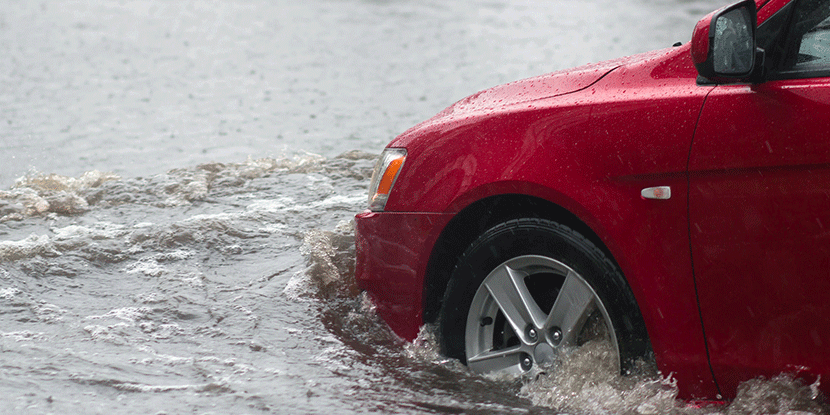5 Reasons To Never Buy a Flood Damaged Car

Climate change’s impact is becoming more evident with each passing year. One of the most visible manifestations of this is floods.
In the UK, floods have become an increasingly regular occurrence. In 2015, there were severe floods in Cumbria, Lancashire and Yorkshire. This led to many people having to abandon their homes and cars. While some people could salvage their vehicles, others were not so lucky. Their cars were either swept away or damaged beyond repair.
However, opportunists always see disasters like this as a chance to make a quick buck. They will buy up flood-damaged cars, clean them up and then sell them on, often without disclosing that the car was damaged in the flood. If you’re not careful, you could buy one of these cars.
Why Should You Not Buy A Flood Damaged Car?
There are many reasons why you shouldn’t buy a flood-damaged car. Here are just a few:
1. The Car May Not Be Roadworthy
When considering the purchase of a used car, it is crucial to assess its roadworthiness. Flood-damaged vehicles pose a significant risk in this regard. Floodwaters can infiltrate various components of a car, causing extensive damage that may not be immediately apparent. The electrical systems, including the wiring, sensors, and electronic control units, are particularly vulnerable to water damage.
Exposure to water can lead to corrosion, short circuits, and malfunctions in the car’s electrical system. This can affect critical functions such as the engine, transmission, braking system, and safety features. Even if a car initially appears to be in good condition after a flood, the hidden damage may compromise its roadworthiness over time.
Water can also contaminate the car’s fluids, including the engine oil, transmission fluid, and brake fluid. Mixing water with these vital fluids can lead to decreased performance and potential mechanical failures. Additionally, floodwater may carry debris, silt, and other contaminants that can accumulate in the engine and other parts, further impairing their functionality.
2. You May Not Be Able to Get Insured
Even if you find an insurer who will cover a flood-damaged car, your premiums are likely to be sky-high. This is because the car is more likely to break down and need repairs. And, if you have an accident in a flood-damaged car, your insurer may not pay out.
3. The Car May Have A Shortened Lifespan
A car damaged in flood is likely to have a shortened lifespan. This is because the water can cause rust and other problems that will slowly but surely eat away at the car until it eventually falls apart. You may be able to get a few years out of it, but it’s not worth the risk.
4. The Car May Not Be Worth The Money
Even if you find an insurer who will cover a flood-damaged car, your premiums are likely to be sky-high. This is because the car is more likely to break down and need repairs. And, if you have an accident in a flood-damaged car, your insurer may not pay out.
5. You Could Be Breaking The Law
In the UK, selling a car that has been “written off” by an insurance company because of flood damage is illegal. However, some unscrupulous sellers will try to do this anyway. You could be breaking the law if you buy one of these cars.
As you can see, there are many excellent reasons why you shouldn’t buy a flood-damaged car. It’s simply not worth the risk. If you’re looking to buy a used car, do your research and only buy from a reputable dealer.
Is Flood Damage a Write-Off?
In many cases, flood-damaged cars are deemed write-offs by insurance companies. When a vehicle suffers significant damage due to flooding, insurers may determine that the cost of repairs exceeds the vehicle’s value. Consequently, they declare it a total loss and issue a salvage title.
A salvage title means that the car has been written off by an insurance company and classified as a total loss. It serves as a warning to potential buyers that the vehicle has undergone severe damage. Insurance companies typically sell salvage vehicles through auctions to salvage yards or rebuilders who may attempt to repair and resell them.
While some salvage cars can be restored to a roadworthy condition, flood-damaged vehicles pose unique challenges. The extensive damage caused by water can be difficult to repair fully, and even if repairs are made, there may be long-term issues that compromise the vehicle’s safety and reliability.
It is worth noting that purchasing a car with a salvage title may have legal implications. Some jurisdictions require thorough inspections and stringent requirements before allowing the registration and operation of a salvage vehicle on public roads. Additionally, insurance coverage for salvage cars may be limited or more expensive to obtain.
Given the potential risks and complications associated with flood-damaged cars, it is generally advisable to avoid purchasing vehicles with salvage titles. Investing in a reliable, non-damaged vehicle will likely provide better long-term value and peace of mind.
How To Avoid Buying A Flood-Damaged Automobile
If you’re looking to buy a used car, you can do a few things to avoid ending up with a flood-damaged one. Here are a few tips:
- Do your thorough research: You can avoid many scams by thoroughly researching the car you want to buy and the seller.
- Check for water damage: Look for signs of water damage on the inside and outside of the car. You can do this yourself, but it’s always best to take the car to a mechanic you trust for a thorough inspection.
- Check the electrics: Water and electricity don’t mix, so if the car’s electrical system has been damaged, it’s probably not worth buying. It would help if you got the car checked by a mechanic.
- Get a car history check: A salvage check will tell you if the car has been “written off” by an insurance company because of flood damage.
- Inspect the car carefully: Look for signs of water damage, such as rust or mould. If you’re unsure, ask a mechanic to check it for you.
By following these simple tips, you can avoid purchasing a flood-damaged car. Do your research, inspect the car carefully and get a free car check to be sure. And, if you’re unlucky enough to have your automobile damaged in a flood, make sure you get it repaired by a professional before you drive it again.
Frequently Asked Questions
How can I tell if a car has been flood-damaged?
It can be challenging to detect flood damage, especially if the seller has attempted to conceal it. Look out for signs such as musty odours, water stains, damp carpets, or visible rust under the seats and dashboard. Also, be cautious if the car’s title has been branded as salvage or if the price seems unusually low for the make and model.
Can flood-damaged cars be repaired?
While some flood-damaged cars can be repaired, the extent of the damage and the associated costs should be carefully evaluated. Water damage can be pervasive and affect critical components, making repairs expensive and potentially unreliable. It is generally recommended to avoid flood-damaged cars due to the risk of hidden issues.
Can flood-damaged cars be insured?
Insuring flood-damaged cars can be challenging. Some insurance companies may refuse coverage altogether, while others may offer limited coverage or charge higher premiums. It is essential to consult with insurance providers to understand the options and requirements for insuring a salvage vehicle.
Are flood-damaged cars a good deal if repaired?
While flood-damaged cars might seem like a bargain, the risks and potential costs associated with repairing them often outweigh the initial savings. Repairs may be expensive, and there is no guarantee that all the damage can be fully repaired. It is generally more advisable to invest in a non-damaged vehicle for better reliability and safety.
Are flood-damaged cars only a concern in the UK?
No, flood-damaged cars can be a concern in any region prone to flooding. However, the UK’s unpredictable weather patterns and occasional severe flooding make it a country where flood-damaged cars are a particular concern. It is important to exercise caution when purchasing used cars in flood-prone areas worldwide.






